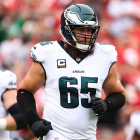Agent's Take: 20 lessons from huge free agent deals, seismic trades
Lessons from free agency? Ndamukong Suh's deal will create a ripple effect, as will Big Ben's, and it's a great time to be a CB. Here are 20 takeaways.

13. Philip Rivers' contract extension apprehension
Rivers says he is reluctant to consider a contract extension because of the Chargers' potential move from San Diego to Los Angeles. But it could really be a negotiation ploy. Pro Bowl running back Marshawn Lynch used the threat of retirement to help get a two-year, $24 million extension from the Seattle Seahawks with a $5 million raise in 2015 from his scheduled $7 million salary. Rivers’ apprehension might lead to the Chargers making him a better offer than he would have gotten otherwise in an attempt to keep him from playing out the final year of his contract so using a franchise tag on him in 2016 wouldn’t be necessary.
14. Miami's miscalculation with Charles Clay
The Miami Dolphins could have prevented tight end Charles Clay from signing a difficult-to-match offer sheet with the Buffalo Bills by giving him a franchise tag for $8.347 million instead of a $7.071 million transition tag. The extra $1.276 million would have essentially taken Clay off the market because no team would have been willing to give up two first-round picks for him with an unmatched offer sheet.
15. Charles Clay's contract
There has been a suggestion that Buffalo significantly overpaid Clay by signing him to a five-year, $38 million offer sheet, which the Dolphins declined to match. Any experienced agent was going to target a deal in the same neighborhood as the $38.6 million maximum value (included $19 million in guarantees) of the five-year contract Jared Cook signed with the Rams as a free agent in 2013. Clay's $24.5 million in guarantees, of which $23 million was fully guaranteed at signing, and his $24.5 million in the first two years of the deal are tops for a tight-end contract. This might seem a little excessive, but it was necessary for the Bills to frontload the contract -- particularly with a large salary and cap number in 2016 -- in order to deter the Dolphins from matching the offer. Whether Clay can start producing like one of the NFL's highest-paid tight ends remains to be seen.
16. Chris Borland's return of signing bonus
Chris Borland agreeing to return three-fourths of the $617,436 signing bonus ($463,077) he received as a part of the four-year rookie contract he signed last year isn't a magnanimous gesture. There are performance obligations associated with all NFL signing bonuses. Teams are entitled to recoup a portion of signing bonuses when players hold out, retire or receive suspensions under the NFL's PED and substance-abuse policies, among other things. Based on language in the CBA and his contract, Borland is entitled to only one-fourth ($154,359) of his bonus. Borland voluntarily returning the remainder of the bonus prevents the 49ers from being in a somewhat awkward of position of demanding repayment from a player retiring for safety reasons.
17. Use of Peyton Manning's pay cut
Manning probably envisioned the Broncos putting the $4 million pay cut he took to use in free agency. Instead, the Broncos are being judicious in the open market after making a splash the previous two years. Manning might have been prepared for the loss of tight end Julius Thomas in free agency, but the offensive line, which needed an upgrade anyway, hasn't been addressed in a significant fashion since left guard Orlando Franklin signed with the Chargers. Shelley Smith, who has 11 starts in 36 career games, was quickly given a two-year, $4.25 million contract (worth up to $5.65 million through incentives) to compete with Ben Garland for Franklin's spot after the Dolphins released him. I can't imagine Manning will be pleased if there aren't any more veteran additions to the offensive line and the 28th overall pick in the draft is used to address other needs.
18. Buffalo Bills defensive signing priority
The Bills kept the NFL's best defensive line intact by giving Jerry Hughes a five-year, $45 million contract (worth up to $50 million through incentives). The surprising move was signing defensive tackle Kyle Williams to a one-year, $10 million contract extension so that his deal runs through the 2017 season, when fellow interior defensive lineman Marcell Dareus is making $8.06 million in his contract year. Reworking Williams' deal added $550,000 to the team's current salary cap and increases his 2015 salary from $5.3 million to $9 million. It also set a salary floor of $10 million annually for a Dareus deal since he's entering his prime at 25 years old and Williams is 31.
19. The Rodney Hudson effect
The Oakland Raiders making Hudson the NFL's highest-paid center with a five-year, $44.5 million contract increases the likelihood that Alex Mack will void the final three years of his five-year, $42 million deal with the Cleveland Browns in 2016 -- provided that he stays healthy and performs like he did before breaking his leg during the middle of the 2014 season. Mack has $24 million remaining on his contract after this year. His deal briefly made him the NFL's highest paid center before the Pittsburgh Steelers signed Maurkice Pouncey to a five-year extension averaging $8,827,325 million last June. Mack should be able to exceed the $27.55 million in the first three years of Hudson's deal and make more than his scheduled 2016 salary ($8 million) in a new deal with a bounce-back season.
20. Marcedes Lewis' Fate
The Jacksonville Jaguars making Julius Thomas the NFL's second-highest-paid tight end with a five-year, $46 million contract (containing $24 million in guarantees) surprisingly hasn't made Marcedes Lewis expendable. Lewis has a $6.8 million salary in 2015 on an $8.2 million cap number, which is the final year of a five-year, $34 million deal (worth up to $38 million through salary escalators and incentives) he signed in 2011. Even though Lewis is overpaid, it might make sense for the Jaguars to keep him at his current salary because of the CBA's requirement that teams spend 89 percent of the salary cap in cash during the four-year period of 2013 through 2016. Jacksonville's spending through 2014 was slightly over 82 percent.
Joel Corry is a former sports agent who helped found Premier Sports & Entertainment, a sports management firm that represents professional athletes and coaches. Before his tenure at Premier, Joel worked for Management Plus Enterprises, which represented Shaquille O'Neal, Hakeem Olajuwon and Ronnie Lott.
You can follow him on Twitter: @corryjoel | You can email him at jccorry@gmail.com















